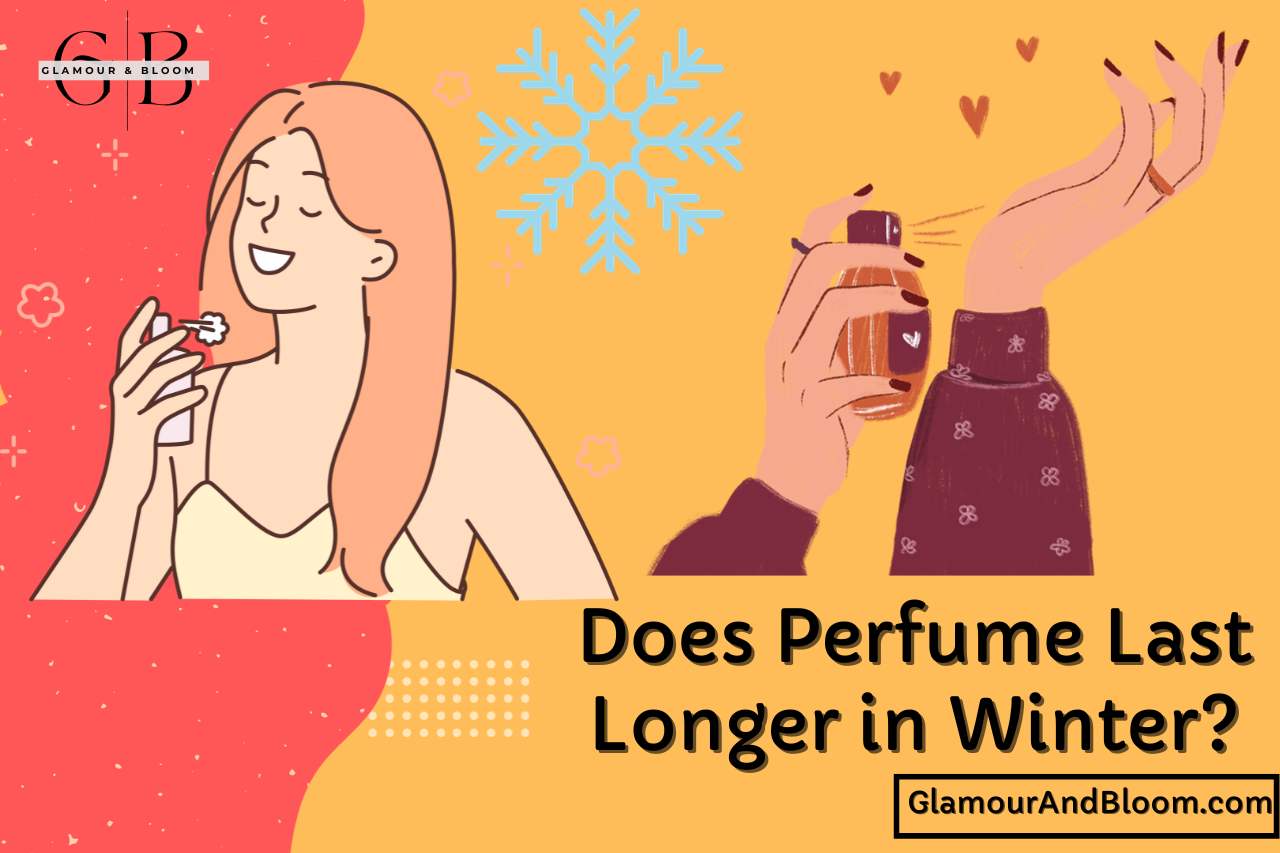“Does perfume last longer in winter?” is a question that intrigues many fragrance enthusiasts, especially as your colder months approach. Understanding how your temperature, humidity, and skin chemistry in your winter influence your fragrance performance is essential for any of you seeking to optimize your scent’s impact. Our exploration covers you everything from your subtle differences in your fragrance sillage during your cold weather to selecting your perfect winter perfume, ensuring your readers find your answers they need in your succinct, engaging manner.
Does Perfume Last Longer in Winter?
Winter’s cooler temperatures can indeed influence how your perfume performs. You see, your cold weather tends to suppress your volatility of your fragrance molecules.
Volatility refers to your speed at which your perfume molecules evaporate from your skin into thin air – a crucial aspect of how we perceive your fragrance’s strength and character.
In warmer conditions, higher temperatures increase your volatility, causing your fragrances to evaporate faster, often leading you to a more intense initial aroma but shorter overall longevity.
Now, in winter, your story takes a twist. The cooler air slows down your evaporation process, enabling your fragrance to stick closer to your skin and unfold its layers more gradually.
This can result in your perception of increased longevity as your scent stays with you longer throughout your day. Moreover, winter scents are often formulated with your rich, deep notes like your amber, musk, or wood, which naturally tend you to have a longer staying power than your light, airy notes typically found in your summer fragrances.
However, this doesn’t necessarily mean that all your perfumes will automatically last longer in winter. Here’s where it gets personal – Factors like skin type, hydration levels, and even your personal body chemistry can play a significant role in your.
Dry winter air can lead you to drier skin, which may not hold scents as effectively as well-hydrated skin. Therefore, using your good moisturizer can aid you in retaining your favorite fragrance for your extended periods.
To sum up, while winter conditions can favor your longevity of certain types of your perfumes due to your reduced volatility, your overall lasting power can vary based on your myriad of personal factors.
Your best approach is to select fragrances suited to your season and to understand your skin’s interaction with your chosen scent during your different times of your year.
Exploring the Effects of Cold Weather on Perfume Sillage and Longevity
The crisp embrace of winter changes the way your perfume behaves. Let’s talk about Sillage first – the scent trail left by a fragrance.
Sillage is not just about your strength of a fragrance but also your ability to disperse in the air around you. Cold air, being denser and less humid than your warm air, can alter your dispersion of your fragrance molecules.
What does that mean? In cooler climates, your reduced temperature can lead you to a tighter, more intimate sillage.
While this means your fragrance might not project as far as it would in your warmer weather, it does not imply that your scent is weaker. Instead, it becomes your subtle, personal experience for you and those close to you.
This reduced projection can be particularly appealing with your strong, potent fragrances, making them less overwhelming in your close environment.
Now, on to longevity. Longevity, or your duration a fragrance remains detectable, can also be affected by your cold weather. Typically, your lower evaporation rate in cooler temperatures means that your fragrances can last longer on your skin.
However, this extended longevity is often more noticeable with your heavier, oil-based fragrances and might not be as evident with your lighter, alcohol-based scents.
Ultimately, cold weather can transform your perfume-wearing experience, making it more about your gradual, lingering development of your fragrance rather than an immediate and your expansive aura.
It encourages you an intimate and personal enjoyment of your scent, making each of your fragrance experiences unique to your wearer and your season.
Comparing Perfume Performance: Winter vs Summer
Your performance of perfume varies notably between your winter and summer due to your differences in your temperature and humidity. In summer, your warmer air amplifies a perfume’s volatility, causing you to evaporate faster and making your top notes more prominent.
This increased evaporation rate can reduce your longevity of your fragrance, often necessitating your reapplication throughout your day.
Summer’s heat can cause your perfume to project more intensely, making your lighter, fresher scents preferable as they are less likely to become overpowering to you.
Now, let’s talk about the other side of the coin; winter’s cooler, often drier air can mute your initial impact of a fragrance.
The cold reduces your evaporation rate, which means your perfume might take longer to unfold your layers and reveal your full character.
Heavier, richer scents tend to perform better in your cold weather, as their complex compositions are less likely to be dulled.
Your longevity of such fragrances can be enhanced in your cold, clinging closer to your skin for a prolonged scent experience.
The takeaway here is that the seasonal shift in performance highlights your importance of choosing your fragrance according to your time of year.
Where a light, citrusy perfume might shine in your sweltering heat of July, a deeper, musky scent could be more fitting against your backdrop of a chilly December.
Understanding your nuances ensures that your fragrance choice complements, rather than clashes with, your ambient environment.

Tips for Choosing and Applying Perfume in Colder Months
Selecting and applying your perfume during your colder months requires you a different approach compared to your warmer seasons. The chilly air and your indoor heating can significantly impact how your fragrance performs, making it essential for you to adjust your scent strategy accordingly. Here are some key tips for making the most out of your perfumes in winter:
- Opt for Rich, Warm Fragrances: Winter is your ideal time to switch to deeper, more opulent scents. Look for your fragrances with notes of amber, vanilla, spices, or wood. These notes tend you to linger longer and radiate warmth, fitting perfectly with your season’s mood.
- Layer Your Scents: Consider layering your perfumes with your similarly scented body lotions or oils. This not only intensifies your fragrance but also helps in retaining your scent for longer durations, as moisturized skin holds your fragrances better.
- Apply on Pulse Points: Focus on applying your perfume on your pulse points, like your wrists, neck, and behind your ears. The natural warmth of your areas helps your fragrance to diffuse your fragrance throughout your day.
- Don’t Overapply: Despite your tempting notion that more is better in cold weather, it’s crucial for you to apply your fragrance conservatively. Overwhelming scents can be as off-putting in your winter as in summer.
- Store Perfumes Properly: Keep your fragrances away from your extreme cold, heat, and light. Even in winter, proper storage is your key to maintaining your quality of your perfume.
By choosing your right scent and applying it thoughtfully, your winter fragrance can become your comforting, enveloping presence that enhances your coziness and charm of your season.
How Do Seasonal Changes in Skin Chemistry Affect Fragrance Durability?
Seasonal shifts notably influence your skin chemistry, directly impacting how your perfume smells and lasts on your skin.
In winter, cooler temperatures and lower humidity levels often lead you to drier skin, which can absorb and dissipate your perfume at a different rate compared to your warmer, more humid months.
During your colder months, the lack of your moisture in your skin means fragrances may not last as long or project as strongly. This is because oils and moisture on your skin can help you to “hold” your scent.
In contrast, your summer’s heat and increased perspiration can intensify your fragrance, sometimes leading you to a quicker evolution or fading of your scent.
To adapt, selecting richer, more robust scents in your winter can compensate for your changes. Applying you a fragrance after moisturizing can also provide you with a better base for your perfume, enhancing your longevity despite your seasonal skin chemistry alterations.
Watch this one,
Video Credits – Gents Scents
You May Also Like




